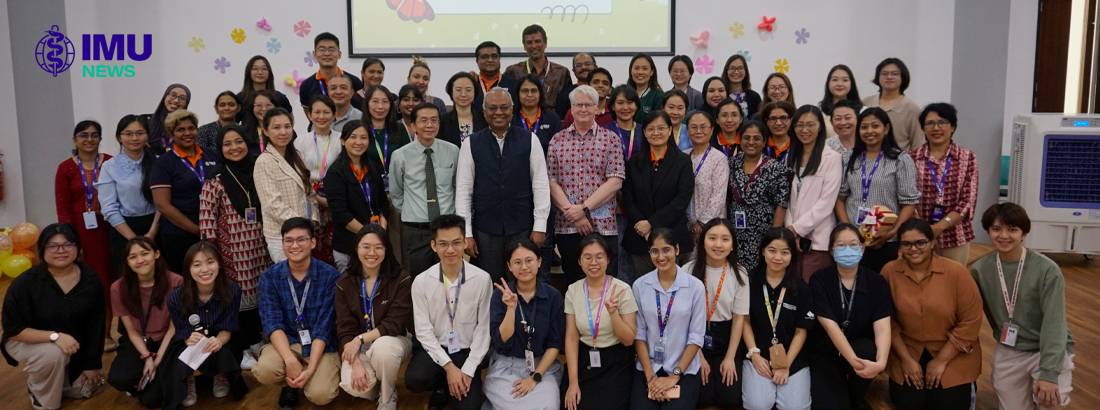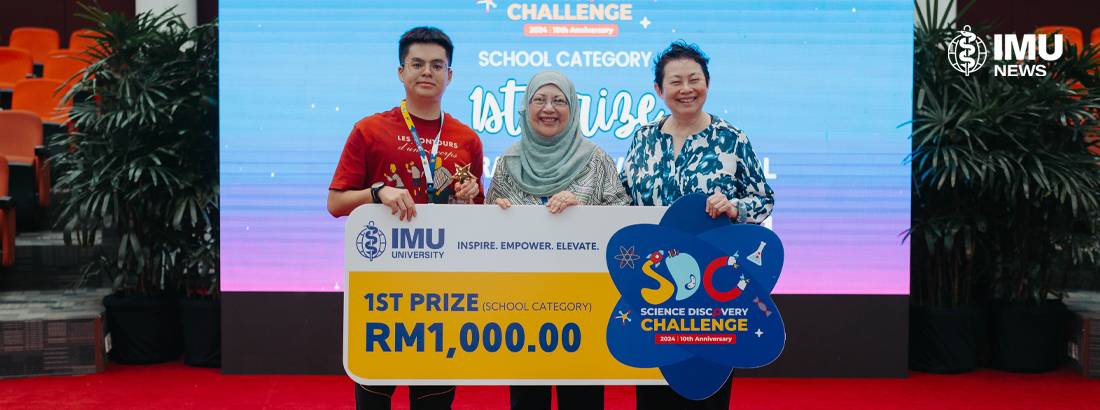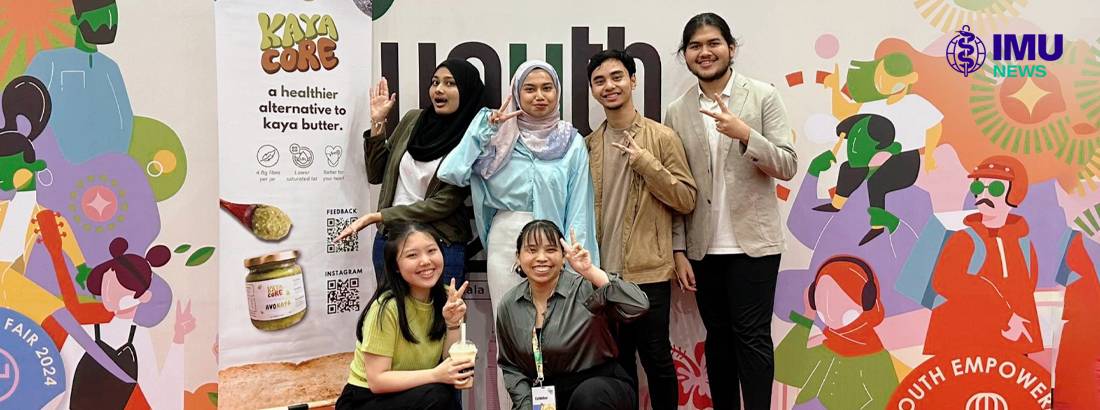As the IMU University welcomes Academician Professor Emerita Datuk Dr Asma Ismail as its Vice-Chancellor on 1 August 2024, we take a little time to get to know her.
Academician Prof Emerita Datuk Dr Asma Ismail was born in Jitra, Kedah. The eldest – and only – girl of three siblings, she admits to bossing her younger brothers around. “Now, we are great friends and we learn from each other,” she says. She spent part of her childhood in Kedah but moved to Penang when she was nine as her father’s job relocated the family to the island.
After her primary school education in Penang, she enrolled into Tungku Kurshiah College in Seremban, a top boarding school for girls, where she finished her secondary school education before leaving to the United States as a MARA scholar. In the US, she graduated from University of Nevada Reno (UNR) and continued to gain her Masters in Microbiology at Indiana University. She later completed her PhD in cellular and molecular biology at the UNR School of Medicine.
She returned to Penang at 28, to join the Universiti Sains Malaysia (USM) School of Medical Sciences, where she was part of the 20 pioneer academics who helped set up the school. “I remember being interviewed for an academic post at USM in my kitchen in the US. The food I served must have been alright since I was offered the job!” she recalls.
She had not charted a career path for herself, beyond envisioning herself as a good scientist and an impactful researcher with the end game of becoming a professor. “I never imagined that I would one day lead USM as its first lady Vice-Chancellor,” she says. At USM she also set up its Institute for Research in Molecular Medicine (INFORMM). INFORMM which became among the first to be recognised by the Ministry of Higher Education as a Higher Institution Centers of Excellence (HiCoE) – a government initiative to drive translational research excellence in the field of diagnostics.
It was during her time at USM, that she met the IMU University’s founders, and had close associations with many of the top management of IMU University who had previously been at USM.
Now, she takes the helm at the IMU University as its Vice-Chancellor and is looking forward to working with old and new friends. “Fate has a way of determining my professional career. I must say that it’s not about where you get the degree, but it’s what you do after the degree. To me, the best kind of education is one that builds your character, values, drive and passion in whatever you want to do,” she says.
Here, she shares more insights in a short Q&A:
Has taking the lead on things always come naturally to you?
I was class monitor in my primary school days, so I learned to take on leadership roles early. However, it was when I had to move schools in the middle of Standard 3 – from Kedah to Penang – that really taught me to rise to the challenge. I had been put in one of the lower streams and this made me feel down as I was used to being in the top class. It was my father who encouraged me to show the school what I was capable of. He had been the biggest influencer in my life. He taught me then to embrace and adapt to change. I learned to act on situations and try to go around obstacles and never use obstacles as an excuse to block me in what I want to do. So, I rose to the challenge and became first in the whole of Standard 3 and was upgraded to the top class the next year. Till today, I carry this lesson with me and do not believe in lamenting.
How has fate led you to the path you are on now?
I left for university at the tender age of 17. At that time, my decision to go to the US was truthfully based on my desire to meet Michael Jackson! I never got a chance to meet him personally in the end but managed to meet other celebrities in the US. I basically grew up as an adult in the US. Those were the best years of my life. I graduated on time with Distinction from the University of Nevada Reno (UNR) at 21, became a Phi Kappa Phi member and it was also there that I met my best friend who is now my husband.
Out of all your achievements, what are you most proud of? Why?
As an academic scientist and researcher, I am most proud of the impact created in the research and development of TyphidotTM, the rapid diagnostic kit for typhoid. At that time, with this kit, we managed to shorten the time it takes to get a diagnosis from 4-5 days to 3 hours. Today newer versions can produce results in 5 minutes.
Most importantly, we managed to use technology to help the poor. Big companies do not want to develop technology for the poor since the poor cannot pay. As a research team, this – the development of technology and innovations for low resource settings or for the marginalised population – became a blue ocean.
The Typhidot technology allowed us to get 16 patents at national and international levels. The test was sold to more than 18 countries around the world and advocated by the World Health Organization. More than 2 million people have benefited from this test. This became Malaysia’s R&D success story and because the kit was sold in USD, it brought about foreign exchange to the country. I had attained more than 100 awards and recognitions for the development and commercialization of Typhidot.
Has it been easy to gain recognition as a local researcher? How has the landscape of academia-industry collaborations changed over the years?
Until today, based on the World Bank report of 2020, compared to other East Asian countries, Malaysian science and technology developed by our own locals are not yet well received by our industries. Our industries still prefer to adopt and buy foreign technologies. We still believe that what the West creates is the best. This is a sad state since our industries will lose out on competitive advantage in global business. We need to keep pace with the disruptive technologies in order to compete in the new economy and our industries need to use homegrown technologies to get ahead.
For example, with the Typhidot technology in 1994, Malaysians were very sceptical about the capability of Malaysian scientists. While the kit was well received overseas in Philippines, Pakistan, Indonesia and other countries, my research team and I went through a lot of trials and tribulations to get people to use our kit locally.
Commercialisation of R&D was a new concept at that time and generating income from R&D was also not emphasised. We did not have collaborations between academia and industry, so industries were not part of the design thinking for academia to develop innovations. We just saw them as potential business partners when we developed the products and many a times our products were not yet ready for the market.
Now of course commercialisation of R&D is a requirement and income generation is part of being entrepreneurial.
I truly hope that we can get over the colonial mindset. Trust in Malaysian science needs to be there. We should encourage “Buy Malaysian Technology First”. Then perhaps the country will begin to see the returns on the R&D money that the government has invested in Malaysian research.
In January 2023, Forbes Asia magazine named you Top 50 women over 50 from Asia Pacific that had reached new heights in contributing to the field of higher education, research and innovation as well as policy in the fields of Science, Technology, Innovation and Economy locally and abroad and for inspiring the next generation. How did you feel about this and what did this acknowledgement mean to you?
I was pleasantly surprised since I had never applied to be recognised by Forbes Asia magazine. To be recognised among the top 50 women over 50 in Asia, was like a dream and I thank whoever that has nominated me to be on the list. Now I do my part to nominate more women to be on the list and I pray that more Malaysian women will make the mark.
To me, I do what needs to be done either as a researcher, as Director General of higher education or even as the science advisor to the country. If the impact of what I had done is appreciated, it is truly a bonus.
What is success to you?
Success as a leader is not counted by how high you have climbed but by how many people you have brought with you. To me success is about creating more leaders and not more followers. I am blessed to see many leaders among the young scientists and academics that have enriched my life and look forward to seeing them fly.
What message do you have for potential students and aspiring scientists?
Have courage and self-belief in your capabilities. Recognise the value of your talent and its potential impact to society. Trust yourself and your abilities, as confidence is key to success.
To be successful, embrace collaboration and networking. Today is the era of collaboration. Build and nurture a strong professional network to exchange ideas and support.
Seek mentors to support and help you in your professional journey. Find sponsors who can open doors and provide opportunities for you. Actively seek advice and feedback to continuously learn and grow.
Speak with passion and experience but be realistic in what you have to say. People will take you more seriously if you speak from the heart with passion and, more importantly, with experience.
Choose a life partner who is understanding and supportive of your ambitions. A supportive life partner will help you achieve work-life balance. He or she will also not clip your wings and hence allow you to fly.






No approved comments.